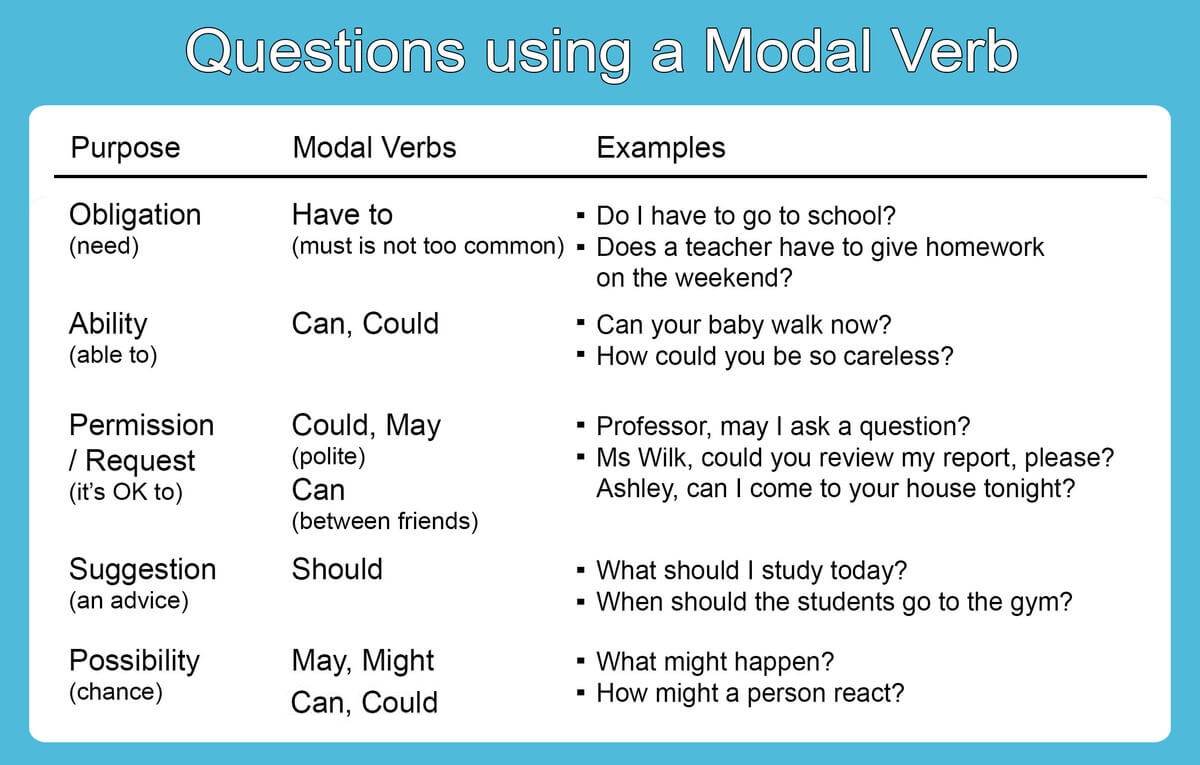Using a Modal Verb to Ask a Question
- Modal verbs like "can" or "could" can be used to ask polite questions.
- 5W1H questions are Who, What, When, Where, Why, and How.
- Using certain modal verbs like "could" and "may" with 5W1H can make your questions sound more courteous.
- Different modal verbs are used in different situations. For example, "may" is used to ask for permissions or to make requests. "Should" is used to indicate advice, suggestion, or obligation.
This lesson will guide you through the correct formation of 5W1H questions using modal verbs, beginning directly with the question word. These structures are crucial for sounding polite and engaging in effective communication.
Choosing the Right Modal Verb
The choice of modal verb affects the tone and formality of your question. Here’s when to use each:
- Can: Generally informal, used for straightforward requests or questions. It implies capability or possibility.
- Could: More polite than "can," suitable for formal or sensitive contexts. It suggests a conditional possibility or past ability.
- May: Very polite, often used in formal settings to ask for permission or make requests. It denotes permission or likelihood.
- Would: Conveys a polite and tentative tone, typically used in formal or uncertain situations. It is used for hypotheticals or polite requests.
- Should: Indicates advice, suggestion, or obligation. It is less forceful than "must" but more than a simple suggestion.
- Will: Used to express future actions decided at the moment of speaking or known facts about the future. It denotes determination or inevitability.
- Might: Used for possibility, often less certain than "may". It's suitable for polite suggestions or expressing uncertainty.
- Must: Indicates necessity or compulsion. It's a strong modal used for obligations or deducing facts.

Grammar Rule for Asking 5W1H Questions
Grammar Rule: Question word + modal verb + subject + base verb + additional information (if needed).
Examples:
-
What can you do to help me?
Question word ("What") + modal verb ("can") + subject ("you") + base verb ("do") + additional information ("to help me").
-
When could we meet again?
Question word ("When") + modal verb ("could") + subject ("we") + base verb ("meet") + additional information ("again").
-
Where may I find the documents?
Question word ("Where") + modal verb ("may") + subject ("I") + base verb ("find") + additional information ("the documents").
-
Why would they change the plan?
Question word ("Why") + modal verb ("would") + subject ("they") + base verb ("change") + additional information ("the plan").
-
How can we solve this problem?
Question word ("How") + modal verb ("can") + subject ("we") + base verb ("solve") + additional information ("this problem").
Using Modal Verbs in Different Contexts
It's important to match the modal verb to the social or professional setting. For instance, "could" and "would" are preferred in formal emails or meetings, whereas "can" and "may" might be more suitable in everyday conversations or less formal emails.
By practicing these structures, you'll be able to frame your questions to be more effective and appropriate to the context, thereby enhancing your communication skills in English.
この文法をAI英語教師と一緒に練習してみませんか?
ALULAのAI英語教師は、対話形式で実践的な練習を通じてあなたの文法力とスピーキング、リスニングなどのスキルを向上させます。また、このトピックに関する100以上の練習問題を用意しており、あなたの理解を深めるのに役立てることができます。
スマホやタブレットでALULAを無料で試してみてください。








このレッスンについて質問はありますか?以下のコメントセクションで質問してください。